- Home
- Augusten Burroughs
A Wolf at the Table
A Wolf at the Table Read online
A WOLF AT THE TABLE
ALSO BY AUGUSTEN BURROUGHS
Possible Side Effects
Magical Thinking
Dry
Running with Scissors
Sellevision
A WOLF AT THE TABLE
A M E M O I R O F M Y F A T H E R
AUGUSTEN
BURROUGHS
ST. MARTIN’S PRESS NEW YORK
A WOLF AT THE TABLE. Copyright © 2008 by Island Road, LLC. All rights reserved. Printed in the United States of America. No part of this book may be used or reproduced in any manner whatsoever without written permission except in the case of brief quotations embodied in critical articles or reviews. For information, address St. Martin’s Press, 175 Fifth Avenue, New York, N.Y. 10010.
www.stmartins.com
Book design by Phil Mazzone
ISBN-13: 978-0-312-34202-9
ISBN-10: 0-312-34202-0
First Edition: May 2008
10 9 8 7 6 5 4 3 2 1
AUTHOR’S NOTE
Some names have been changed.
For Christopher Schelling, who is short and mean and saved my life and gave me every star that I pointed to. This book belongs to you. Because I never could have written it without your brutish and relentless love. I know I never say it, but I cherish you and love you with all my heart.
ACKNOWLEDGMENTS
I am indebted to Jennifer Enderlin, Tanya Farrell, Frances Coady, John Sargent, Sally Richardson, John Murphy, Christina Harcar, Steve Troha, and everyone at St. Martin’s Press and Picador; Haven Kimmel, Robert Rodi, Jeffrey Smith, Timothy Sommer, Lawrence David, Lori Greenberg, Sheila Cobb, Lona Walburn, Jon Pepoon, Suzanne Finnamore, Jill Clayburgh, Dan Peres, Sarah Wynter, Russell Nuce, my Uncle Bob and Aunt Relda, my brother and his family, Judy Robison, and especially Dennis Pilsits, without whom there would be no point. I would also like to thank Paul Sleven and Jonathan Albano for their intrepid support.
In loving memory of George Nicholas Stathakis
A WOLF AT THE TABLE
IF MY FATHER caught me he would cut my neck, so I just kept going. Broken sticks and sharp stones gouged my bare feet, but I didn’t consider the sensation. A branch whipped across my face; I felt the sting and for an instant I was fully blind, but I didn’t stop.
His flashlight sliced into the woods on either side of me. The beam was like a knife, and I didn’t want it on my back. He was out there, behind me somewhere in these woods.
I dashed to the right through a clutch of young silver birch trees and ran up the embankment, crouching to maintain speed. With his bad knee, he would have trouble with the hill. Lumbering forward, he would need to pause and massage the swollen, throbbing kneecap, catch his breath.
When I realized the jabbing slash from his flashlight was gone, I worried that he had cut around and was one step ahead of me. That he was already on the hill, climbing it from the other side. What if I reached the top and he was there waiting?
I veered back to the path, then crossed it. I wanted to pause and listen, but I couldn’t. Fear pressed me forward. My breathing roared in my head as though my ears were beside a gigantic heaving machine, a bellows stoking some hellish fire.
Even though I was wearing only pajamas and had no shoes, I wasn’t cold. I wasn’t anything at all. I was only a blur.
When I stepped on a branch, the rough bark cut deep into my arch, but I just kept going. The pain exploded in my foot and shot out the top of my head, and then was left behind in my wake.
I paused finally and watched the trees for slashes of light but saw none. As my heart settled and my ears became less occupied, I listened and heard nothing but the thready pulse of the night. And I sensed that the hunt was over. Prey knows when it has escaped.
ONE
SITTING IN MY high chair, I held a saltine cracker up to my eye and peered through one of the tiny holes, astonished that I could see so much through such a small opening. Everything on the other side of the kitchen seemed nearer when viewed through this little window.
The cracker was huge, larger than my hand. And through this pinprick hole I could see the world.
I brought the cracker to my lips, nibbled off the corners, and mashed the rest into a dry, salty dust. I clapped, enchanted.
THE HEM of my mother’s skirt. A wicker lantern that hangs from the ceiling, painting the walls with sliding, breathing shadows. A wooden spoon and the hollow knock as it strikes the interior of a simmering pot. My high chair’s cool metal tray and the backs of my legs stuck to the seat. My mother twisting the telephone cord around her fingers, my mouth on the cord, the deeply satisfying sensation of biting the tight, springy loops.
I was one and a half years old.
THESE FRAGMENTS ARE all that remain of my early childhood. There are no words, just sounds: my mother’s breathy humming in my ear, her voice the most familiar thing to me, more known than my own hand. My hand still surprises me at all times; the lines and creases, the way the webbing between my fingers glows red if I hold up my hand to block the sun. My mother’s voice is my home and when I am surrounded by her sounds, I sleep.
The thickly slippery feel of my bottle’s rubber nipple inside my mouth. The shocking, sudden emptiness that fills me when it’s pulled away.
My first whole memory is this: I am on the floor. I am in a room. High above me is my crib, my homebox, my goodcage, but it’s up, up, up. High in the air, resting upon stilts. There is a door with a knob like a faceted glass jewel. I have never touched it but I reach for it every time I am lifted.
Above my head is a fist of brightness that stings my eyes. The brightness hangs from a black line.
I am wet-faced and shrieking. I am alone in the awake-pit with the terrible bright above my head. I need: my mother, my silky yellow blanket, to be lifted, to be placed back in my box. I am crying but my mother doesn’t come to pick me up and this makes me mad and afraid and mad again, so I cry harder.
On the other side of the door, he is laughing. He is my brother. He’s like me but he’s not me. We’re linked somehow and he’s home but he’s not home, like my mother and her voice.
Opposite this door against the wall, there is a dresser with drawers that my mother can open but I cannot, no matter how hard I pull. The scent of baby powder and Desitin stains the air near the dresser. These smells make me want to pee. I don’t want to be wet so I stand far away from the dresser.
This is my first whole memory—locked alone in my room with my brother on the other side of the door, laughing.
There is another memory, later. I am in the basement sitting on a mountain of clothing. The washer and dryer are living pets; friendly with rumbling bellies. My mother feeds them clothing. She is lifting away pieces of my mountain, placing them into the mouth of the washer. Gradually, my mountain becomes smaller until I can feel the cool of the cellar floor beneath me.
A form on the wooden stairs. The steps themselves smell sweet and I like to lick them but they are coarse and salty; they don’t taste as they smell and this always puzzles me and I lick again, to make sure. The thing on the stairs has no face, no voice. It descends, passes before me. I am silent, curious. I don’t know what it is but it lives here, too. It is like a shadow, but thick, somehow important. Sometimes it makes a loud noise and I cover my ears. And sometimes it goes away.
“DID MY FATHER live with us at the farmhouse in Hadley?”
I was in my twenties when I called my mother and asked this question. The farmhouse—white clapboard with black shutters and a slate roof—sat in a brief grassy pasture at the foot of a low mountain range. I could remember looking at it from the car, reaching my fingers out the window to pluck it from the field because it appeared so tiny. I didn’t understand why I
couldn’t grab it, because it was just right there.
“Well, of course your father lived with us at the farmhouse. He was teaching at the university. Why would you ask that?”
“Because I can remember you, and I can remember my brother. And I can remember crawling around under the bushes at the red house next door.”
“You remember Mrs. Barstow’s bushes?” my mother asked in surprise. “But you weren’t even two years old.”
“I can remember. And the way the bushes felt, how they were very sharp. And there was a little path behind them, against the house. I could crawl under the branches and the dirt was so firm, it was like a floor.”
“I’m amazed that you can remember that far back,” she said. “Though, I myself can also remember certain things from when I was very little. Sometimes, I just stare at the wall and I’ll see Daddy strolling through his pecan orchard before he had to sell it. The way he would crack a nut in his bare hands, then toss those shells over his shoulder and wink like he was Cary Grant.”
“So he was there?” I pressed her.
“Was who where?” she said, distracted now. And I could picture her sitting at her small kitchen table, eyes trained on the river and the bridge above it that were just outside her window, the phone all but forgotten in her hand, the mouthpiece drifting away from her lips. “Yes, he was there.” And then her voice was clear and bright, as though she’d blinked and realized she was speaking on the phone. “So, you don’t remember your father there at all?”
“Just . . . no, not really. Just a little bit of something on the stairs leading to the basement with the washer and dryer and then this vague sense of him that kind of permeated everything.”
“Well, he was there,” she assured me.
I tried to recall something of him from that time; his face, his hands, his memorable flesh. But there was nothing. Trying to remember was like plowing snow, packing it into a bank. Dense whiteness.
I could remember the pasture in front of the house and standing among rows of corn as tall as trees. I could remember the smell of the sun on my arms and squatting down to select pebbles from the driveway.
I could remember how it felt to rise and rise and rise, higher than I’d ever gone before as my trembling legs continued to unfold and suddenly, I was standing and this astounded me and I burst out laughing from the pure joy of it. Just as I threatened to fall on my face, my leg swung forward and landed, and so fast it seemed to happen automatically, my other leg swung forward and I did it again—my first step!—before tumbling forward onto my outstretched hands.
But I could remember nothing of my father.
Until years later, and then I could not forget him no matter how hard I tried.
TWO
BENEATH THE SUN I watched the steps pass quickly between my legs, one after the other after the other. The singularity of the motion hypnotized me as I climbed higher, higher up the Pyramid of the Moon in Mexico.
On the steps below me my mother shouted, “Stop, Augusten! Stop right now!” But with my legs scrambling, my hands gripping the step ahead and then pushing it down to meet my feet, the sun so burning white that it filled the entire sky, I’d entered a kind of a trance where nothing existed but the next step. Finally, she was able to catch up and grab me by the ankle.
Breathless, she cried, “My God, why didn’t you listen? I was just terrified that you’d trip and fall all the way down.”
It was the first time in my life I’d experienced a feeling close to achievement.
I saw that if I continued this strange land-swimming, this intoxicating crawling, climbing, clinging, I would make it to the very top of the world.
I didn’t know what a pyramid was. Not once did I consider the consecrated land upon which it was built, or the powerful ancient society that created it. I knew only that it was overwhelming, magnificent, and must be climbed.
My mother waited until I turned five before taking me to Mexico. We’d come with her best friend, Hyacinthe, and Hyacinthe’s son, Peter, who was also five. The weeks leading up to the trip had been painful, with repeated visits to the doctor for inoculations.
My mother packed our blue hard plastic American Tourister suitcase with Vienna sausages, which we ate from the can with plastic forks. We drank only bottled Cokes.
During the day we walked through the city, paying for pastries with coins. Clusters of street musicians seemed to follow us. I saw a monkey walking on a leash and thought it was an ugly foreign child. Flags quivered on thin wooden sticks outside cafés, rose petals were strewn on the sidewalk; there were straw sombreros, peeling plaster, and tiny green glass bowls handed out as souvenirs at all the restaurants. Mexico was a swirling blur of color and blast, screaming confusion, and vibrant aromas. Peter and I held hands tightly and charged down the sidewalk, ahead of our bare-legged mothers. We dashed into every store, giggling as we shouted, “¿Habla usted inglés? ¿Habla usted inglés?”
In an instant Peter was gone. He’d broken away from me and run ahead on his plump little legs and now his mother cried, “But where did he go? Did you see? Where is my Peter?” We all three turned around and around on the sidewalk, like ballerinas from three different music boxes, looking everywhere but seeing nothing, calling his name and hearing only the sounds of the city in return.
I clung to my mother as we entered stores and asked if they’d seen a little boy, about my height, my age but with dark hair instead of blond. It was strange, his sudden disappearance, but I accepted it. I expected never to see him again; the hungry city had eaten him. But suddenly his mother spotted him standing beside a policía and she ran, screaming, weeping, and waving her arms crazily above her head. I was mystified. In the room that night I’d asked my mother, “But how did she find him? How?” The feeling was like seeing someone step up into the air and fly away. How?
My mother held my hand tighter after this, her fingernails biting into my wrist. But she could not protect me.
We visited deep, slick-walled caves, our guide a local man who warned, “People have been lost in these tunnels. Unless you know them very well, it’s easy to mistake one passage for another.” He wore white and looked like light itself and I followed him faithfully, utterly trusting him.
The tunnels were dark and cool. Somewhere in the center of the cave, he cupped his hands into a black, still body of water and held them out for me to drink, drops falling from his fingers. The water was sweet, so cold it numbed my throat.
Outside, he pulled the needle from a cactus and showed me how, with the fibrous thread still attached, you could stitch a wound if you had to. My mother called me away from him. “Come now,” she warned me in a whisper. “We don’t really know this man.” But he adored me and I knew it. This was a new, euphoric sensation. My first taste of a drug. I wanted more.
Reaching out for his hand, I twisted the silver ring on his thick, hairy finger. He smiled and slipped off the ring, dropped it into my palm. He closed my fingers around it and with his other hand gently stroked my cheek. “I had a boy just your age,” he said to me softly as my mother pulled me into step beside her. “Wave good-bye,” she said, and I did, turning back to watch him as she led me away. I waved and waved and waved.
In a restaurant, I sat on the chair with my feet tucked beneath me. I wiggled and swung my arms, shrieking, laughing, telling her all I had noticed.
The man had given me his ring and I was happy. It was much too large for my fingers, so my mother kept it in her purse. I continuously watched her bag, as though it might suddenly glow with my ring in its belly.
I was drunk. I was silly and sloppy with joy because the man, who said he’d had a boy my age, loved me and I knew it and felt it and I wanted to go back to him.
The chair tipped. I fell and silently impaled myself through the back on an ornate decorative iron spike attached to the radiator beside me.
Pinned like a butterfly to a setting board, I could not move. I began to cry, growing more afraid as the grown-ups left
their tables to gather around me, frantically motioning and shouting in Spanish.
My mother quickly pulled me off the spike and held me against her chest, blood staining her fingers. The manager rushed to the table. He spoke Spanish, she spoke English; language bounced between them, landing nowhere. At last, he drew a map on a napkin and she carried me to the hospital in her arms.
She was relieved, so relieved, to have an American doctor. He told her, “Another inch to the left and he’d have been paralyzed for life.”
This memory is vaporous to me now. Dissolved by the medication I was given at the time, it has eroded to almost nothing but her recounting of the story so many years later. “I was just terrified to be in a foreign country, to be in a Mexican hospital. I looked around and felt frantic by how dirty it was.”
IN MEXICO MY mother wore thin-soled sandals and looked over her shoulder. She watched me through large, dark sunglasses and said, “We had to get away from your father. He’s not safe to be around right now.”
This is my first clear memory of my father: I am in Mexico, I am five, and he is not safe to be around.
I could not fathom what this meant. The things I knew that weren’t safe included furious dogs, putting a fork in a toaster, rushing water. How was he like these things?
Everywhere we went, an awareness followed us: we were fleeing. The feeling tainted even the food we hastily ate out of the cans stacked in her suitcase, a measure of economy. I was not allowed to have ice because it, too, was unsafe.
WHEN WE RETURNED, we did not go home to the new red house in the woods of Shutesbury. We’d moved into the new red house when I was three. I remember seeing it when it was only wood bones, like the skeleton of a whale. Instead, we went to an apartment in the center of the town of Amherst that I had never seen before. It was on the second floor of a house and had a bay window in the living room, a small kitchen with a cold tile floor. The bathroom had a tub with claw feet and I had my own bedroom. It was just the two of us. My mother sat me on her lap as she explained that my brother was down south with our grandparents, Jack and Carolyn.

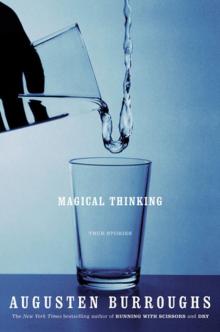 Magical Thinking: True Stories
Magical Thinking: True Stories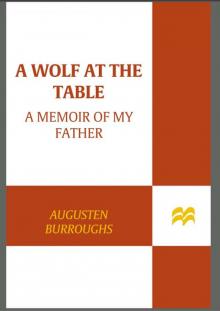 A Wolf at the Table
A Wolf at the Table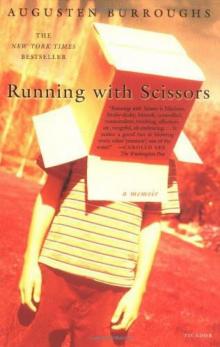 Running With Scissors
Running With Scissors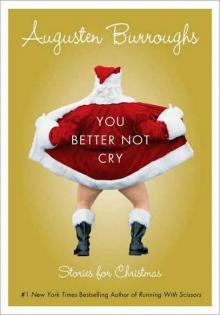 You Better Not Cry: Stories for Christmas
You Better Not Cry: Stories for Christmas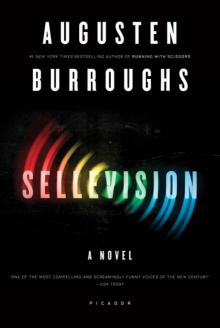 Sellevision
Sellevision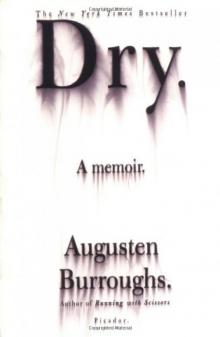 Dry
Dry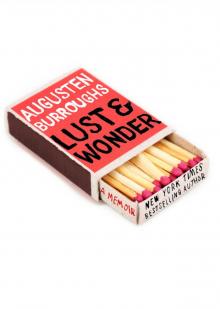 Lust & Wonder
Lust & Wonder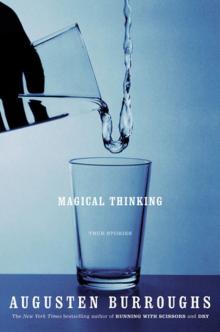 Magical Thinking
Magical Thinking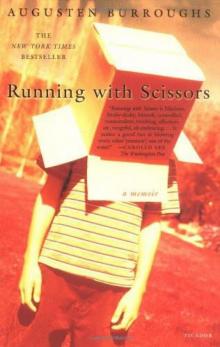 Running With Scissors: A Memoir
Running With Scissors: A Memoir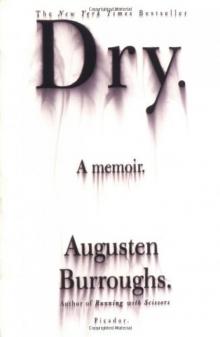 Dry: A Memoir
Dry: A Memoir